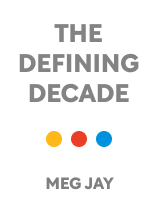

This article is an excerpt from the Shortform book guide to "The Defining Decade" by Meg Jay. Shortform has the world's best summaries and analyses of books you should be reading.
Like this article? Sign up for a free trial here .
Are you looking for the best quotes from The Defining Decade? Can these quotes help you prepare for your future in your 20s?
These quotes from The Defining Decade cover author Meg Jay’s advice on life, love, and planning for your future. Being in your 20s is hard, but with these kinds of guides, it doesn’t have to be.
Keep reading for four great The Defining Decade quotes.
The Defining Decade Quotes
These quotes from The Defining Decade can help explain themes in the book about love, work, and building your self.
“Forget about having an identity crisis and get some identity capital. … Do something that adds value to who you are. Do something that’s an investment in who you might want to be next.”
While having your identity crisis, you need to be not only reflecting on your life but also actively accumulating experiences that will form your “identity capital”: the sum of your personal resources. Your identity capital is the collection of things you’ve done long enough or well enough that they become part of who you are. It’s the intangible currency we use to obtain jobs and relationships. It includes quantifiable measurements like your schools, clubs, jobs, hobbies, and degrees. It also includes more unquantifiable things like your temperament, how you approach problems, and how you present yourself to the world through your clothes, your vocabulary, and your personality.
“Twentysomethings who don’t feel anxious and incompetent at work are usually overconfident or underemployed.”
Baby Boomers and the generations preceding them often started their adult lives around age 20, getting married, starting families, establishing careers, and building a home life. Today’s generations of young adults start their lives much later, believing that they don’t need to start making serious decisions until age thirty, and that their twenties are a time for unencumbered fun.
However, the truth is that a good career and a good relationship don’t magically appear at age thirty. To ensure they will happen for you in your thirties and forties, when you finally feel ready for them, you need to prepare for them in your twenties. Meg Jay is a clinical psychologist who specializes in helping twenty-somethings figure out their lives. In The Defining Decade, she offers insights to help you take control of your life and pave the way for future happiness in both work and love. Your decisions today can greatly affect your options tomorrow, and she encourages all twenty-somethings to take these years seriously—even while having fun.
“For the most part, “naturals” are myths. People who are especially good at something may have some innate inclination, or some particular talent, but they have also spent about ten thousand hours practicing or doing that thing.”
Real confidence doesn’t come from ignoring your anxiety or from listening to friends and family tell you you’re wonderful. Real confidence comes from the mastery of skills. You will feel authentically confident only when you’ve overcome challenges and accumulated successes.
To become someone who regularly masters skills, you first need to cultivate a “growth mindset” instead of a “fixed mindset.” People with a fixed mindset see their own skills and talents as all-or-nothing propositions: They either have it or they don’t. They’re smart or they’re stupid. People with a growth mindset believe that their own skills and talents are in a constant state of change, and can be improved with practice and knowledge.
You then need to devote about 10,000 hours to learning your skill. Research shows that the best predictor of a person’s success is not innate talent but instead, the amount of time she invests in the endeavor, and consistently, across all kinds of industries from medicine to music, mastery of a skill comes after about 10,000 hours of dedicated practice.
“It’s the people we hardly know, and not our closest friends, who will improve our lives most dramatically”
You don’t exist in a vacuum, and a large piece of your identity, and your identity capital, is determined by the people in your life. Some of your personal ties are stronger than others. You have strong ties to those you spend a lot of time with or have known for many years. In childhood these include family and long-time friends. In your twenties these grow to embrace roommates, partners, and other close friends: your so-called “urban tribe.”
You have weak ties to people you’ve met infrequently or who are connected to you through a mutual friend. These might be a colleague from a different department, a neighbor you rarely see, a former employer, or a friend-of-a-friend you keep meaning to get in touch with.
Though you feel more comfortable around your strong ties, the people with whom you have weak ties are most likely to help you move forward in your pursuits. This is because your strong ties are like you: They think like you, have similar life experiences, or are from the same places. Therefore, they have little to add to your journey, either in work or love. They know the same things and the same people you know. Your strong ties can also prevent you from moving forward by lulling you into a sense of behavioral complacency. These people love you as you are and give you no incentive to conduct yourself in a more professional or presentable manner.
Use these quotes from The Defining Decade to help you get a more positive experience in your own life.

———End of Preview———
Like what you just read? Read the rest of the world's best book summary and analysis of Meg Jay's "The Defining Decade" at Shortform .
Here's what you'll find in our full The Defining Decade summary :
- Why the twenties are your most important decade
- How you were fooled into thinking it was an extended period of youth and freedom
- Why you should use this decade to find personal and professional success






